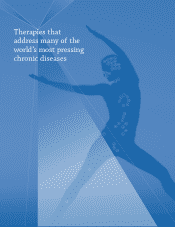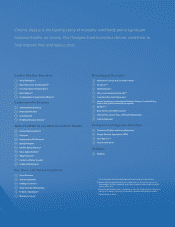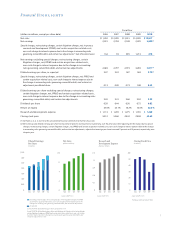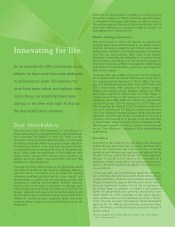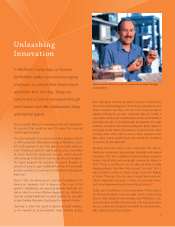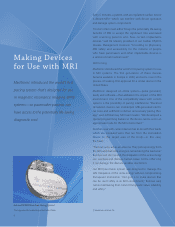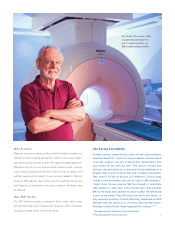Medtronic 2010 Annual Report Download - page 13
Download and view the complete annual report
Please find page 13 of the 2010 Medtronic annual report below. You can navigate through the pages in the report by either clicking on the pages listed below, or by using the keyword search tool below to find specific information within the annual report.
team that worked with the pair to fully develop DBS for
movement disorders. “However, it was very difficult to find
exactly the right spot in the brain. To help qualify locations,
surgeons would stimulate various parts of the brain, and
when the tremors stopped, they knew that was the area
to ablate,” Rise explained. “The doctors made the connection
to use chronic stimulation as the therapy, not just the tool to
identify the location in the brain.”
In the late 1990s, Belgian neurosurgeon Prof. Bart Nuttin
made a similar connection for treating severe OCD, which
also was historically treated by lesioning a portion of
the brain.
“Prof. Nuttin’s early investigations with DBS to treat OCD
caught the attention of psychiatrists and neurosurgeons
from other leading institutions. Medtronic helped bring
these physicians together as a collaborative working
group to support the pursuit of DBS applications for
severe psychiatric conditions,” said Paul Stypulkowski, Ph.D.,
Medtronic Distinguished Scientist. The collective work
of these researchers resulted in Medtronic DBS Therapy
being FDA-approved for severe OCD,** the first commercial
use of DBS for a psychiatric indication.
Now, the group is exploring DBS to treat depression. “While
DBS therapy for OCD is intended to treat the severe anxiety
associated with OCD, a noticeable benefit in some patients
was mood improvement and a reduction in depressive
symptoms,” Stypulkowski said. “After this was observed, we
worked with several leading researchers in this area to
explore the potential for DBS in depression. We started by
supporting small trials in collaboration with physicians. Since
then, we’ve taken what we learned from that experience to
develop a well-designed clinical trial as part of our intention
to pursue this indication.”
One of the team members, Dr. Donald Malone Jr., Director of
the Center for Behavioral Health at Cleveland Clinic, appreci-
ates Medtronic’s unique approach to collaboration. “With
Medtronic, we actually work with scientists. We’re not being
asked by a business person how many of these we think we
can sell. We’re being asked by technical people to discuss
the pros and cons of various stimulation parameters and
electrode placements. This is true scientific collaboration.”
Medtronic Distinguished Scientists Mark Rise, Ph.D., (second from left) and Paul Stypulkowski, Ph.D.,
(far right) collaborate regularly with neurosurgeon Dr. Ali Rezai (far left) and psychiatrist
Dr. Donald Malone Jr. who worked together at Cleveland Clinic. “We each bring different strengths
to the table,” said Stypulkowski of their work to develop DBS for treating psychiatric disorders.
“The medical doctors understand the clinical and surgical perspective, and neuroscience related to
the disorders. We understand the technology and how to apply it for their clinical needs.”
This post-operative X-ray shows the target area
for delivering DBS therapy to treat obsessive-
compulsive disorder (OCD). The targets for
treating Parkinson’s disease, essential tremor,
and dystonia are all within centimeters of the
OCD target.
** Medtronic Reclaim DBS Therapy for OCD is approved under a Humanitarian
Device Exemption (HDE).
9


